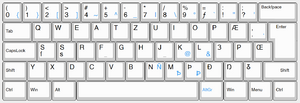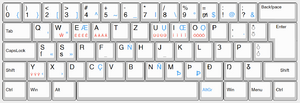QWEATZ: Difference between revisions
No edit summary |
|||
| Line 1: | Line 1: | ||
{{wip}} | {{wip}} | ||
'''QWEATZ''' (/ˈkwiːts/) is a keyboard and typewriter layout used for the [[Furbish Fluvan#Spelling|Furbish]] and other Abosian-derived alphabets. Its name comes from the first six keys on the top row | '''QWEATZ''' (/ˈkwiːts/) is a keyboard and typewriter layout used for the [[Furbish Fluvan#Spelling|Furbish]] and other Abosian-derived alphabets. Its name comes from the first six keys on the top row ({{keypress|{{wp|Q}}}} {{keypress|{{wp|W}}}} {{keypress|{{wp|E}}}} {{keypress|{{wp|A}}}} {{keypress|{{wp|T}}}} {{keypress|{{wp|Z}}}}). | ||
First developed in 1878 as a variation of the Fluvannian {{wp|QWERTY}} keyboard to include letters used in the Furbish alphabet, the QWEATZ keyboard did not see much use outside The Furbish Islands until after the 1980s when Fluvan was adopted as the world language. Countries where [[Furbish Fluvan]] was dominant, including [[Alaoyi]], [[Gagium]], [[Greater Niagara]], and [[Hrvada]], adopted the QWEATZ layout. Variations exist by country and language. | First developed in 1878 as a variation of the Fluvannian {{wp|QWERTY}} keyboard to include letters used in the Furbish alphabet, the QWEATZ keyboard did not see much use outside The Furbish Islands until after the 1980s when Fluvan was adopted as the world language. Countries where [[Furbish Fluvan]] was dominant, including [[Alaoyi]], [[Gagium]], [[Greater Niagara]], and [[Hrvada]], adopted the QWEATZ layout. Variations exist by country and language. | ||
Latest revision as of 23:29, 26 October 2023
This article is incomplete because it is pending further input from participants, or it is a work-in-progress by one author. Please comment on this article's talk page to share your input, comments and questions. Note: To contribute to this article, you may need to seek help from the author(s) of this page. |
QWEATZ (/ˈkwiːts/) is a keyboard and typewriter layout used for the Furbish and other Abosian-derived alphabets. Its name comes from the first six keys on the top row (Q W E A T Z).
First developed in 1878 as a variation of the Fluvannian QWERTY keyboard to include letters used in the Furbish alphabet, the QWEATZ keyboard did not see much use outside The Furbish Islands until after the 1980s when Fluvan was adopted as the world language. Countries where Furbish Fluvan was dominant, including Alaoyi, Gagium, Greater Niagara, and Hrvada, adopted the QWEATZ layout. Variations exist by country and language.
Overview

The left side of the QWEATZ layout has several changes from the Fluvannian QWERTY layout. The Y and Z keys are swapped. The left shift is shorter to make room for another key. Both the D and R keys are lower, with A replacing the R key. In the spot of the A key is a second S key, which represents a long s when lowercase, while the second s key has the round s. Both keys have the same capital S.
The letter keys on the right side of the QWEATZ layout are the same as the QWERTY layout. Additional letters found in Furbish English are placed to the right of those keys. The two keys to the right of the P key are typically dead keys, with other unused keys being used for punctuation, though this depends on the specific layout. Unlike most layouts, on the QWEATZ layout the 0 key is to the left of the 1 key at the end of the row of numbers.
History
Variants
The Furbish Islands

The most common keyboard in The Furbish Islands is the FBS 1055 keyboard, also known as the Furbish Standard Multilingual keyboard. The standard was first published in 1976 and combined features of keyboards used throughout the country. It was designed for Agnian, Bergwieser, Eilandwons (and Onslander), Fluvan, Gagian, Niagaran, and Serran, the most widely spoken languages in The Furbish Islands, but can also be used for a number of other languages.
Alaoyi

The Alaoyian version of the keyboard has support for all national and regional languages in addition to Furbish Fluvan. It is described by ABBR 1337.
Greater Niagara

The Greater Niagaran version of the keyboard is described in ABBR 69420 published in 1984. It described two keyboard layouts, 69420-1 and 69420-2, the latter supporting Sámi languages in addition to Furbish Fluvan Niagaran.

